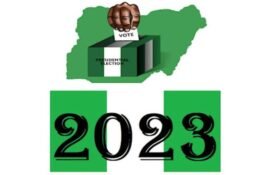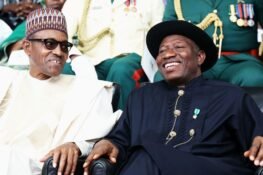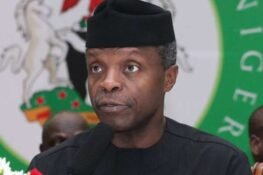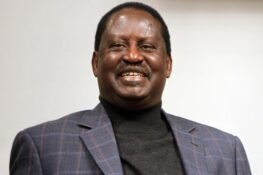Ahead of the African Union heads of state meeting in Niger yesterday, Nigeria was not the only West African country that had not signed the continental free trade agreement, which many are promising will foster a new era of trade and prosperity on the continent.
Nigeria’s neighbour, Benin Republic, had also not signed up to the free trade area. It’s a country of 11 million people and has a GDP of about $10bn. Yet, Benin is one of Nigeria’s biggest trading partners on the African continent.
While the Nigeria Port Authority has been battling with port congestion for years, which has greatly affected commercial activities in Apapa and environs, not once has NPA considered expanding facilities in the neighbouring country.
But they didn’t really have to. Benin’s entire economy is centered around its ports, which it continues to expand and which have been built to service the Nigerian economy both officially and unofficially.
The country exports millions of tonnes of rice, thousands of cars to Nigeria each year.
But these are products Benin itself does not produce. So a continental free trade agreement, which will give 52 other African countries open and easy access to the Nigerian market is something it is not prepared for.
Overnight, it will lose its comparative advantage unless it can show more creativity and export or produce cheaper goods.
But is Africa late in setting up free trade rules at a time a world superpower is claiming some international trade rules take away its sovereignty?
Just at a time when the future of open borders and international free trade appears to be imperiled, African countries are forging ahead with its version of a continent wide free trade area.
And Nigeria has just joined the bandwagon of countries to sign the Africa Continental Free Trade Agreement with President Muhammadu Buhari putting pen paper in Niamey, Niger.
But is Africa late in setting up free trade rules at a time a world superpower is claiming some international trade rules take away its sovereignty?
It could be a response to a rising China, which never fails to take advantage of loopholes in trade laws, but today, international trade institutions are under threat.
In recent years, the United States of America, which has the world’s largest economy and is the biggest contributor to international trade, has been breaking one WTO rule after another.
Citing national security, it recently imposed steel and aluminum tariffs on the European Union against WTO rules.
The US has also being doing all it can to undermine the dispute resolution mechanism of the World Trade Organisation, which makes it almost impossible that some of the unilateral actions it has taken can be resolved by the international institution.
But even in Europe, the impending withdrawal of Great Britain from the European Union and the rise of a far right, populist party in Italy is threatening the future of the continent as a unified trading bloc.
Apart from the needed infrastructure for financial services that is not dependent on Europe or the United States of America, maybe the biggest hindrance to free trade on the African continent is the lack of transport infrastructure.
Even within countries, there are poor road networks and other forms of transportation are undeveloped.
China has of course been investing heavily in upgrading infrastructure across the continent. It is building the biggest port in Africa with a $10bn investment in Bagamoyo, Tanzania.
It has built a $3.6bn rail network connecting the port city of Mombasa to Kenya’s capital, Nairobi. It has also funded rail projects in Ethiopia, Angola, Djibouti and Nigeria.
China is also developing a Maritime Silk Road running through the Horn of Africa, the Middle East and South Asia as part of its vision of opening trading routes that extend to Europe for its goods and services.
The US has also being doing all it can to undermine the dispute resolution mechanism of the World Trade Organisation, which makes it almost impossible that some of the unilateral actions it has taken can be resolved by the international institution
In that sense, there is an undeniable need to talk about concerns that China would the biggest beneficiary of free trade and open borders in Africa.
Beyond the infrastructural investments it has made on the continent, China has mining rights and direct access to raw materials in a number of countries.
With the country also running some port facilities, it can easily export raw materials, bring them back as finished goods and distribute the goods through the road and rail network it has made possible.
The only question is how much influence China will have in coming up with the trade policies and their day to day implementation by the AfCFTA secretariat.
So, with the pressure local politics is putting on the future of Europe and the US trying to reset trade rules, why are African countries determined to create an integrated trade bloc with open borders, a customs union with common tariffs, a single currency and a shared payment platform?
It is estimated that AfCFTA would boost trade by more than 50 per cent in the next two to three years. As of July 7, 2019, AfCFTA is meant to be operational.
Yet, in so many ways the continent is not ready. A lot to f the technical details have not been agreed upon and much of the operations and monitoring will be done online. How many African countries have that kind of infrastructure?
Few of the countries that have ratified can provide the customs services as envisioned by the agreement.
Though there is no saying when it will ratify the agreements, Nigeria that has just signed on is especially not prepared and will likely not be in the next four years.
In a country like Nigeria, the ministries of trade, finance, agriculture, the CBN, the Nigeria Customs Service and the petroleum industry, which need to have a say it in policy formulation, are not always on the same page
The structure of the AfCFTA secretariat has a Council of Ministers that will set policy and trade goals for the trading area and trade ministers are to represent their individual countries.
In a country like Nigeria, the ministries of trade, finance, agriculture, the CBN, the Nigeria Customs Service and the petroleum industry, which need to have a say it in policy formulation, are not always on the same page.
For that level coordination, President Buhari has to probably set up a trade office in the presidency or in the office of the SGF.
Before signing the agreement, the president had called for a manufacturing agenda for the continent. It’s a call to protect the continent from foreign made goods.
To achieve this, Africans have to start investing in the continent. For the kind of economies that are being planned, no policy and manufacturing agenda can be set without the private sector.
Business mogul, Aliko Dangote, knows Africa like the back of his hand. He is in constant search for business opportunities and spends time and money researching the most profitable.
There are entrepreneurs like him across the continent in Egypt, South Africa, Kenya and everywhere else. These people should help shape trade and manufacturing agenda.
The presidency has already said there were wide ranging consultations before agreeing to sign the AfCFTA.
The presidency also needs to enable private individuals, the Nigerian Economic Summit Group or the Manufacturing Association of Nigeria to make policy contribution at the level of the AfCFTA secretariat.
In 2018 when the first set of countries signed the trade agreement, local media reports on what the agreement entailed and what the Nigerian government position was, were scanty.
It’s about time the Nigerian government made sure the media had better access to the A.U secretariat, to NEPAD and the planned AfCFTA secretariat.
The one aspect of any free trade area that may prove impossible to implement in Africa could be a single currency.
AfCFTA will definitely increase the volume of trade, create jobs and opportunities. But it might be too ambitious to think a single currency can work in Africa
Every country is at a different level of development, doesn’t have the same level of infrastructure and manufacturing strength.
Here manufacturers can simply leverage economies of scale. With over 50 different countries, maintaining a uniform level of inflation will be totally impossible.
Even with a fully integrated trade network some 10 years down the line and assuming everything runs smoothly, some countries will benefit more than others from the trade agreement.
This will produce different levels of growth with some countries desperately needing to make monetary adjustment while others seeks stability.
Europe, probably the most sophisticated and advanced business environment, is struggling to hold the euro zone together. Billions of euros in debt have been written off just to keep Greece in the zone.
What happens if oil prices drop and Nigeria once again runs out of foreign currency?
A single shared currency will stop it from devaluing, leaving it with only the option of borrowing. How will Benin raise money when suddenly, it is over taken by Ivory Coast or Morocco in exporting rice to Nigeria?
AfCFTA will definitely increase the volume of trade, create jobs and opportunities. But it might be too ambitious to think a single currency can work in Africa.








